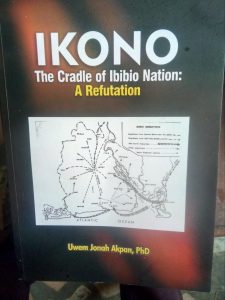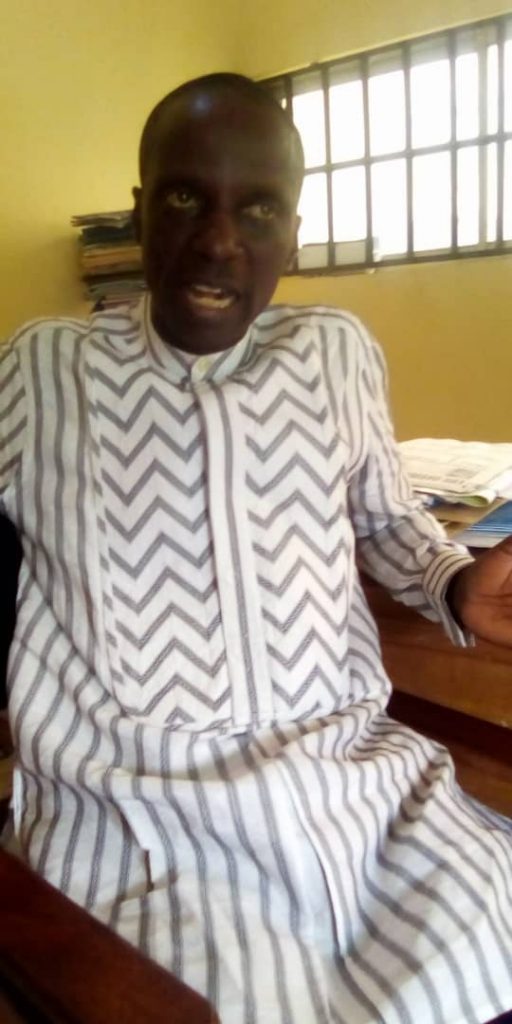In this interview, Uwem Jonah Akpan, a Ph.D holder in African History/International Studies from the University of Calabar, and the author of Ikono The Cradle of Ibibio Nation: A refutation agrees that Ibibios are people of hoare antiquity. In addition, he pans his thinking lens on other burning historical issues in Akwa Ibom and in Nigeria.
Excerpts:
What actually motivated you to write the book- Ikono The Cradle of Ibibio Nation: A refutation?
Thank you. Firstly, I am a historian by the grace of God. The three historians of the book I have successfully refuted are not. Secondly, I am an Ibibio. I have the right to join this kind of debate particularly a debate that evolves around my area of competence. Thirdly, when I read the book: Ikono: The Cradle of Ibibio Nation, I saw a lot of misconceptions, deliberate falsehood, I needed to take a counter stand because it is often said, ‘a people without a culture, tradition and origin is like a tree without roots.’ I wonder what would have happened if this monumental falsehood had not been punctured. So, I was motivated by the love for my race.
Were you sponsored to write the book?
No, it was my personal contribution, my personal efforts.
How much did you spend in research for the publication of the book?
Well, the research took many years I will like to keep that to myself. As I said, the interest was borne out of the love I have for my race. I don’t want to quantify it in terms of money. I am passionate, and this is my area of study. I have done a lot of research on the Ibibio and the entire Akwa Ibom people.
Have you written any book before this time?
Yes, by the grace of God, I have written seven books. In terms of journal articles, I have written 80, and most of my works are on Akwa Ibom.
Can you mention some of the books you have written?
I have published Afaha Iman Ibom: A Historical Perspective in 2007. Another one is 100 years of Etinan Institute From 1915-2015; Akwa Ibom and our Neighbours: A Study of Diplomacy Since Pre-Colonial Time. I am the author of the History of Iman Ibom People, and also a co-author of Uyo: The Identity Revealed; author of 1929 Women’s War, and I am at present working on History of Afaha People and History of Ikono Ibom people.
As a historian, what were the guiding parameters used in writing the book?
Thank you. I have been saying this in my rejoinders, that history is an organised discipline. Just as Law, Journalism, etc, there are ethical questions and issues that you follow in these professions. For instance, you just don’t jump in and write without investigating and having credible sources. History is an evidence-based discipline. Evidence is anything that survives an event and leaves proof that a particular event actually happened. It can have written records, oral tradition, ye witness accounts which you should interpret.
In writing history, one must be trained to identify the sources, collect, coalate, interprete and present the evidence. History is not story telling; a good story can provide information for historians. But, there is a line of demarcation. I approached this work as a historian whereas the authors whose work I deflated, did as non-historians. Eventhough, they are angry, they should not be because they are not trained, obviously they did not respect the rules of engagement.
In Ikono and Ini, do you have some outstanding historians?
Yes. Now, you know what we called literature review? Those who studied in the university will understand what am talking about. When writing, one of the things to do is to cite relevant and related literature – like what the authors who wrote earlier in that area say. Then, you cite it. One of the things literature review does is to bring to fore the existing body of knowledge in that area and it is on that basis that you will identify the gaps that exist in the literature which your work seeks to fill outside that you don’t have any reason to write.
So, there were some iconic historians in Akwa Ibom who have gone to be with their ancestors: Prof. Monday Abasiatai, Prof. Monday Effiong Noah, Prof Dominus Essien, Prof. Okon Edet. The question you should ask is: what did thesspeople say about the Ibibio origin, migration and indeed antiquity. In terms of antiquity, they all agreed that the Ibibio are a people of hoare antiwuity, they agreed with the colonial writers such as: Percy Talbot, .D.W Jefferys, G. I. Jones, Darly etc.
All of them agreed that the earliest set of Ibibio migrants came in from Usak Edet region of the Cameroon before the war at Ibom in present day Arochukwu region of Abia State, took place. They referred to the war as a recent phenomenon, reason being that, the Akpa people the Aro as mercenaries to dislodge the Ibibio from Ibom, used firearms which was introduced to Africa by the Portuguese.
As at now, there are some outstanding historians. One is Prof. Ini Akpan Udoakah. Fortunately, he is from Ikpe clan in Ini Local Governemt Area. I have cited him in my work, his position on the migration of Ibibio, his position on who the Ikpe people are, where the groups migrated from.
Some time ago, some Ini and Ikono elders and stakeholders held a press conference and issued a seven-day ultimatum to you to apologise to them or face a legal action. What is your reaction to that?
It was on the 27th of December 2019, that the press conference was held. Like every other person, I read that in newspapers, watched on the television. In the first place, I have not committed any offence. I have not done anything wrong that warrants any apology (written or verbal). My quick answer is that I don’t owe anybody any form of apology.
Now if you look at the terms of reference when Mboho ndito Ikono Ndo Ini set up that committee that wrote the book- Ikono/Ini Historical and Documentation Committee in 2001, they were asked to research and write on Ikono and Ini people. The writers were the ones that enlarged the scope of their work to include all the Ibibio people. I am an Ibiobio from Iman clan in Etinan. By my training, I have every right to join that debate. During the press conference, they carefully avoided the substance of the matter.
There is no point the authors raised in the book that I have not punctured and discredited. I am challenging them to contend and contest this matter at the realm of knowledge and ideas; they should not be diabolical. This is a modern world. What will they tell the colonial masters that used to take photographs of deities? All the village heads permitted me to take photographs. Men volunteered information, which I did not take permission from them to write or to coin my topic. That is my discretion and I am doing that as a scholar following the benchmark of historical scholarship. If they have any issue with me, they should approach it scholarly and constitutionally.
What they are doing is anti-intellectual, they should follow due process and not resort to threats and intimidation. They should not infringe my fundamental right. This is unconstitutional and it’s illegal. All my informants have the freedom of expression. I don’t have any fears because I have not committed any wrong.
Earlier, before they held the press conference, the lead author precisely David Akpan Ukpong issued a series of threats to me. I have the text messages that he sent threatening that if I don’t withdraw the book from circulation, I will regret my action. I reported the matter to state police headquarters and the matter is being investigated. I don’t want to comment on that. To be candid, I don’t have any fear, where ever they want to take me to, I will go.
This is one book that is going viral. Where can interested readers pick copies from?
For now, copies of the book are available in some book shops, but people can get a copy from me. Soon, I will tell the public where to get it.

To be concluded

